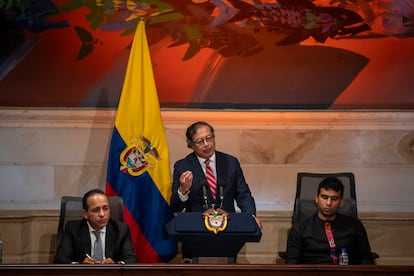Gustavo Petro defends his vision for Colombia before Congress: ‘It’s time for a national agreement’
The president began the second legislative session since his administration began. He defended his commitment to the energy transition and his policy of ‘total peace.’ While did not mention his much-criticized healthcare reform, he did call for a national political agreement to create ‘a more just and productive society’

In the Colombia that Gustavo Petro envisions, there will be moto-taxis powered by solar energy along the Caribbean coast and international airports in the middle of La Guajira desert. The president said all of this on Thursday, when he opened the second legislative session since his administration began in August 2022. He is very familiar with the Congress of Colombia, having previously served as a representative and a senator. Today, he depends on this legislative body — where he no longer has a working majority — to pass the social changes that he has proposed.
For the first time since he began his term, President Petro has promised to sit down and listen to the opposition’s response following his speech. The pulse of the second year will be a battle between the two sides, with each trying to consolidate a majority. Faced with this scenario, Petro spoke of a “national agreement,” adopting a conciliatory tone that’s much closer to the rhetoric he deployed at the beginning of his term, when compared to the recent defiant speeches he’s been making to defend his reforms.
The July 20 speech is normally used by presidents to give an account of the previous year. Petro’s message also included a bit of this. However, he spent much of the time going over the dreams he has for Colombia — the country he wants to turn into a “world power of life” over the next three years that remain of his government.
“What’s in question today, [across] humanity, is life,” said Petro, who spoke throughout his nearly two-hour-long speech with a pencil in his left hand, as if teaching the congresspeople and senators a lesson. He spoke of the possible sixth extinction of the planet if climate change isn’t stopped, noting the high temperatures this summer in China and Germany, all to support his proposal to decarbonize the Colombian economy as soon as possible. A proposal that recently “cost [him] an excellent minister,” he lamented, referring to Irene Vélez — the philosopher and environmental activist who, until this past week, was in charge of the Mining and Energy portfolio. Petro didn’t mention Vélez by name, but says that she made progress in her ministry, getting 134 companies to commit to clean energy projects and the administration’s “energy communities” program: an initiative in which isolated residences and schools can generate their own energy.
“I tell Congress: the demand for oil and coal is going to fall in the coming years,” the president emphasized, making it clear that the rush to decarbonize isn’t merely a whim. Petro considers ending dependence on fossil fuels to be a national priority, even if a good part of Colombia’s revenue comes from oil exports. He sees tourism as a more sustainable economy to develop — in his speech, he noted that, during his first year in power, the number of tourists visiting Colombia has increased to five million. He expects this annual figure to continue rising, eventually reaching seven million. This is one of the economic sectors that he hopes will help replace dependency on oil. Additionally, in terms of the environment, he repeated what has perhaps been the most important achievement of his government so far: the reduction of deforestation by 29% in 2022.
“You don’t industrialize if you don’t carry out agrarian reform,” Petro said, referencing his second major project for Colombia — one of the most ambitious for a left-wing politician who perceives land inequality as being one of the driving causes of war. He assured the legislators and the public that his government has already managed to title 2.5 million acres of land, with many Indigenous groups in jungle areas gaining formal property rights. He also acknowledged that Congress had approved a law that grants land rights to peasants. However, this titling of land isn’t equivalent to agrarian reform, in which large and unexploited pieces of land could be allocated to landless peasants. “We aren’t expropriating the land; we’re buying it at a commercial price,” he clarified, alluding to the agreement that his government has with cattle ranchers to buy 7.4 million acres of their property.
Petro noted that, given the current regulations, he can’t move fast enough to meet that figure in his remaining three years in office. “I propose [that Congress] take a look at a change in regulations,” he added, so that he can more effectively buy 1.2 million acres per year. In his first year, he said, the government had purchased and distributed the equivalent of 75,000 acres.
There was no time in the speech to mention the legislative reform that has been the most controversial in his first year in office — that of health — which caused a crisis in the cabinet. Minister of Education Alejandro Gaviria, who criticized the reform, was dismissed, while Minister of Health Carolina Corcho, the public face of the project, tendered her resignation.
Several traditional political parties aligned with Petro harshly criticized the reform and the removal of Gaviria. The health reform has since stalled in the legislative branch, having only passed one of four readings.
Similarly, Petro didn’t give his pension reform any special mention in his speech. He only referenced the labor reform, suggesting that the media was allied with businesspeople, which resulted in the project’s collapse in the first legislative session. “In all other matters, we’re doing well,” he declared optimistically. He didn’t mention other projects that floundered, such as electoral reform.
The government’s so-called “total peace” policy had a special space in the speech. This strategy involves Petro’s administration sitting down to negotiate with rebel groups and finding a way out of subjecting criminal gangs to justice. The president welcomed the fact that there’s a ceasefire with the ELN guerrillas, which will begin in early August. “The war between the state and insurgencies is coming to an end,” Petro vowed. More than three decades ago, he was part of the M-19 guerrilla group.
Petro also mentioned “the violence of the 21st century” — one that generates violence via “greed, wealth, by income.” This violence doesn’t seek to overthrow a state, he acknowledged, but attempts to strengthen illicit economies, such as drug trafficking, illegal mining, or human trafficking. His mission, in his three remaining years in office, “is to [dialogue] with those who want to get rich with something that no longer has a future.” He was specifically referring to cocaine, whose price has dropped dramatically and is no longer sold as widely in Europe and the United States since the fentanyl boom.
Petro didn’t refer by name to anyone in his political bloc or to independent members of the Chamber of Representatives and Senate, nor to the leaders of the political parties whose support he needs. He ended his speech by calling for a major national agreement, to change “how things are” and achieve the goal of “a democratic and prosperous nation.”
“I believe that a national agreement is about having a more just and productive society,” Petro concluded.
Sign up for our weekly newsletter to get more English-language news coverage from EL PAÍS USA Edition
Tu suscripción se está usando en otro dispositivo
¿Quieres añadir otro usuario a tu suscripción?
Si continúas leyendo en este dispositivo, no se podrá leer en el otro.
FlechaTu suscripción se está usando en otro dispositivo y solo puedes acceder a EL PAÍS desde un dispositivo a la vez.
Si quieres compartir tu cuenta, cambia tu suscripción a la modalidad Premium, así podrás añadir otro usuario. Cada uno accederá con su propia cuenta de email, lo que os permitirá personalizar vuestra experiencia en EL PAÍS.
¿Tienes una suscripción de empresa? Accede aquí para contratar más cuentas.
En el caso de no saber quién está usando tu cuenta, te recomendamos cambiar tu contraseña aquí.
Si decides continuar compartiendo tu cuenta, este mensaje se mostrará en tu dispositivo y en el de la otra persona que está usando tu cuenta de forma indefinida, afectando a tu experiencia de lectura. Puedes consultar aquí los términos y condiciones de la suscripción digital.









































